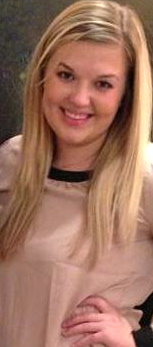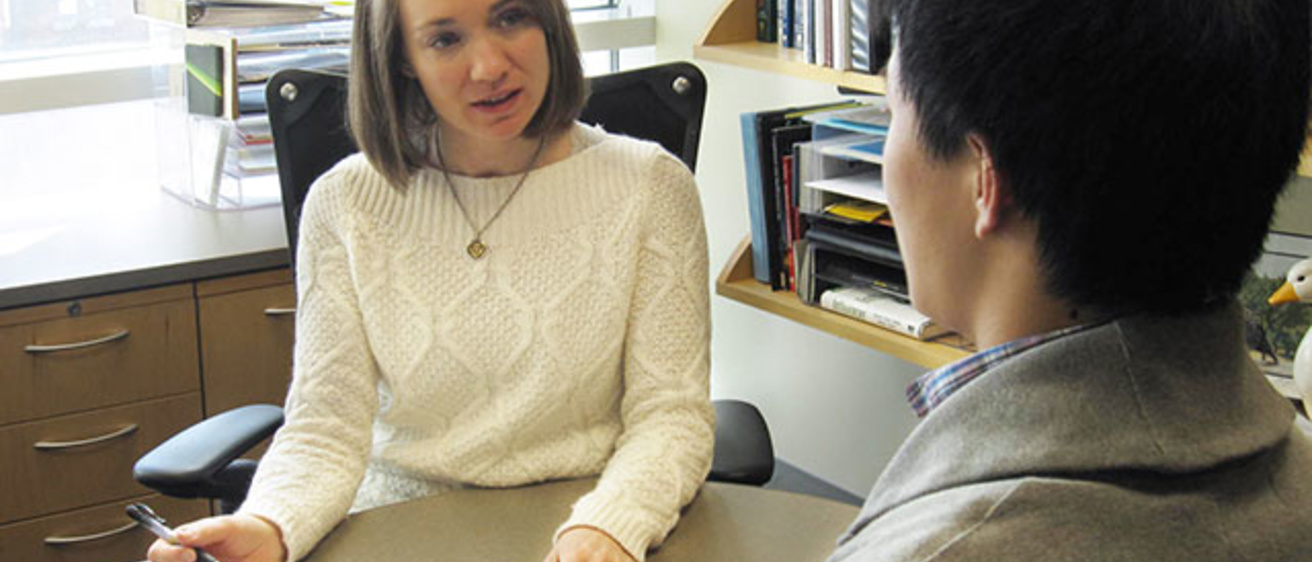Just because the job didn’t exist wasn’t going to stop Sophie Amado from working at the Frank Lloyd Wright Preservation Trust.
Amado, a University of Iowa English major, wanted to intern as a writer at the Chicago-based trust, where she had previously volunteered as a tour guide. But the trust had no such position, and in fact had never hired a writing intern.

So, using the advising she’d received at the UI Pomerantz Career Center, she delivered a pitch that the trust couldn’t refuse. Within a week, they’d hired her for an internship tailored to the skills she’d learned studying in a humanities field.
The Pomerantz Career Center (PCC) provides UI students free services including career development coursework, mock interviews, resume reviews, and job and internship fairs. But its main focus is career advising, which can be especially valuable to students from the College of Liberal Arts and Sciences (CLAS) who graduate with a wide variety of career options and often need help identifying their preferred paths.0
Amy A’Hearn, director of professional development and a career advisor at the center, says advising liberal arts and sciences students requires a slightly different approach than counseling pre-professional majors. “It’s especially important that we teach liberal arts majors how to market their transferable skills,” she says, adding that many employers need to understand the skills these students bring to the workplace.
Valued skills
In fact, they're the same skills employers say they prize most highly. According to the newest survey by the National Association of Colleges and Employers, the top five attributes employers seek are leadership, problem-solving, written communication, ability to work in a team, and analytical skills—all well-known outcomes of a successful liberal arts and sciences education, and skills that will always be relevant, no matter how specialized the workplace becomes.
While media reports suggest that liberal arts majors have a hard time finding jobs, PCC statistics don’t bear that out for UI grads. Of the 1,337 CLAS graduates (out of 1,893) who responded to a follow-up employment survey after graduating in May 2012:
- 59 percent had found permanent employment within seven months
- 29 percent had enrolled in graduate or professional schools within seven months
The placement rate for CLAS graduates (88 percent) is almost identical to that of Tippie College of Business graduates (89 percent, according to follow-up survey results), and it has been for the past five years—through the worst years of the recession.
CLAS graduates have recently secured jobs at Amazon, Argonne National Laboratory, Berkshire Hathaway, Disney, Forbes, GoDaddy, Integrated DNA Technologies, Michael Kors, the State of Iowa, Teach for America, Whole Foods, and Xerox. Top destinations have been Iowa City, Davenport, Chicago, St. Louis, Minneapolis, Denver, and New York City.
Flexibility and adaptability

Allysa Lewis, a senior communication studies major, has been using the career center’s services since her first year at Iowa and recently obtained a retail management position through Hireahawk.com, the PCC’s online board of job and internship postings. She credits her major with giving her the ability to work in a team and the flexibility to adapt to changing circumstances.
“In the working world, job descriptions aren’t always set in stone,” she says. “You’re probably going to be doing a lot of different things, working with a lot of different people. The diversity of my classes has definitely helped me to be able to work on different kinds of projects.”
The main task of a liberal arts job-seeker, then, is to articulate “transferable skills” like adaptability and teamwork, and to describe to potential employers how those skills can be applied to the workplace and benefit their organizations. A’Hearn helps her advisees think about how a class project or paper, a summer job, or participation in a student group made them better communicators, thinkers, problem solvers, or team players, then helps them translate these experiences to workplace-ready skills.
“You want to be able to tell an employer, ‘This is what we learn in my major, and here’s an example proving that I learned it,” Lewis says.
For its part, the career center works with employers to make sure that job listings posted on Hireahawk don’t inadvertently exclude qualified liberal arts and sciences candidates.
“When an employer posts, say, a marketing internship,” says Angi McKie, PCC marketing director, “and they say they’re looking for marketing majors, we often ask if they’d consider other majors that could also bring them the skill set they’re looking for, like journalism or communication studies students.”
Usually, she says, employers are appreciative, saying, “Why didn’t I think of that?”
Both Amado and Lewis are glad to have pursued liberal arts majors, even if they had to do a little extra work on the job-search front. “I actually like looking for jobs in my field,” notes Lewis, “and I’ve enjoyed college so much more because I’ve done something I love.”
